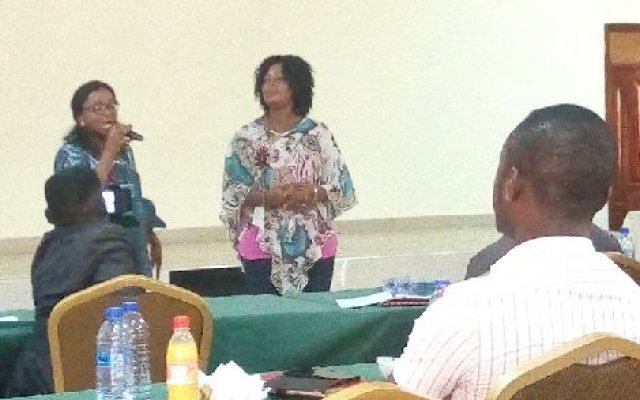Living with HIV; Charity and Gifty share their story
Health News

It’s a scary thing when people despise you for any type of weakness. It is even more disheartening when it is because you are sick and worse still when infected with a virus that does not have a cure.
Two beautiful ladies have dared the world to bring it on. They have sworn to fight against stigmatisation against People Living with HIV and AIDS (PLWHAs) and help others have hope and live normal lives.
The road has been rough and tough; initially with tears along the way. But they have survived. It didn’t kill them, it made them stronger and these ladies ride on the tides of God’s strength with scars of pain and rejection. Now they say they care less.
The Mirror recently had an interaction with two persons living with HIV to celebrate their boldness in fighting stigimatisation.
Closeup with Charity and Gifty
Charity and Gifty have dedicated their lives to helping others living with the disease and are currently HIV ambassadors working with the Ghana AIDS Commission (GAC) to educate the public about the disease.
Charity Owusu Danso, a mother of six, says she got to know her HIV status 17 years ago after her late husband’s death. For her, it had remained a mystery as to how she got the disease but life had to go on.
Charity told The Mirror that life after knowing her status has been heartbreaking and overwhelming.
According to her, she decided to be honest about her status when a gentleman proposed to her and he agreed to marry her despite her status.
She had three children with him all HIV negative with her new husband. “There are ways to stay married to an HIV negative person and not get the virus. It’s all about education,” she stated.
Gifty Sarpong is also an HIV ambassador who had a devastating period dealing with the disease when she was first informed about her status. She said she wanted to take her life but with education and support she now lives a normal life.
Antiretroviral
The ambassadors are currently on antiretroviral drugs and say it has been of great help.
“I have been on antiretroviral drugs for 12 years and it’s worth the use. Unfortunately, because of ignorance many have described the disease as a death sentence and this has left many to die in rejection and pain,” she stated.
Gifty said people often stigmatise PLWHA, resulting in their early deaths. “This attitude must change because the antiretrovirals are here to support those infected. It is the window of hope and people must be made to know about that too,” she indicated.
Media bash
The two were of the view that the media has also contributed immensely to the stigmatisation of PLWHA.
“The way the reports on this disease is sometimes reported in the media often makes it look like some of us are doomed for life.
“We may not have had the courage to come out as ambassadors if we had listened to such reports,” she said.
She said it was time for the media to do more education to give hope to people infected with the HIV virus.
‘Often, the language used on some radio stations to describe the disease is often disheartening. It is about time we changed from the story of doom to that of hope,” she advised.
Presently, Charity and Gifty do peer counselling and education on how to cope with the disease to affected persons.
Charity said she had prevented many suicide attempts. “Several newly infected persons have called or visited my organisations - Crystal Home Base and Aid Aged Foundation, based in Kasoa, in the Central Region, to be counselled.
The two women said it was important for all to join in advocating healthy sexual behaviours which was crucial in preventing the disease. “It’s important that people are made to understand the need to have protected sex, as living with the HIV virus is not easy,” Gifty stressed.
They advised all infected persons to seek professional counselling and support as there is still life and hope after one had been infected.
“We have lived more than a decade and a half with the virus and here we are. There is no need to stigmatise people who are HIV positive. The fight against HIV/AIDS must be won and to win there should be no place for stigmatisation”.
UN report
According to a United Nations report, in 2017 people living with HIV often avoided going to clinics for fear of having their status disclosed or suffer stigma.
The report noted that, across 19 countries with available data, one in five people living with HIV avoided going to a clinic or hospital because they feared stigma or discrimination related to their HIV status.
The report indicated that when people living with HIV wait until they are very ill before seeking help they are less likely to respond well to antiretroviral therapy.
By: www.graphic.com.gh
Two beautiful ladies have dared the world to bring it on. They have sworn to fight against stigmatisation against People Living with HIV and AIDS (PLWHAs) and help others have hope and live normal lives.
The road has been rough and tough; initially with tears along the way. But they have survived. It didn’t kill them, it made them stronger and these ladies ride on the tides of God’s strength with scars of pain and rejection. Now they say they care less.
The Mirror recently had an interaction with two persons living with HIV to celebrate their boldness in fighting stigimatisation.
Closeup with Charity and Gifty
Charity and Gifty have dedicated their lives to helping others living with the disease and are currently HIV ambassadors working with the Ghana AIDS Commission (GAC) to educate the public about the disease.
Charity Owusu Danso, a mother of six, says she got to know her HIV status 17 years ago after her late husband’s death. For her, it had remained a mystery as to how she got the disease but life had to go on.
Charity told The Mirror that life after knowing her status has been heartbreaking and overwhelming.
According to her, she decided to be honest about her status when a gentleman proposed to her and he agreed to marry her despite her status.
She had three children with him all HIV negative with her new husband. “There are ways to stay married to an HIV negative person and not get the virus. It’s all about education,” she stated.
Gifty Sarpong is also an HIV ambassador who had a devastating period dealing with the disease when she was first informed about her status. She said she wanted to take her life but with education and support she now lives a normal life.
Antiretroviral
The ambassadors are currently on antiretroviral drugs and say it has been of great help.
“I have been on antiretroviral drugs for 12 years and it’s worth the use. Unfortunately, because of ignorance many have described the disease as a death sentence and this has left many to die in rejection and pain,” she stated.
Gifty said people often stigmatise PLWHA, resulting in their early deaths. “This attitude must change because the antiretrovirals are here to support those infected. It is the window of hope and people must be made to know about that too,” she indicated.
Media bash
The two were of the view that the media has also contributed immensely to the stigmatisation of PLWHA.
“The way the reports on this disease is sometimes reported in the media often makes it look like some of us are doomed for life.
“We may not have had the courage to come out as ambassadors if we had listened to such reports,” she said.
She said it was time for the media to do more education to give hope to people infected with the HIV virus.
‘Often, the language used on some radio stations to describe the disease is often disheartening. It is about time we changed from the story of doom to that of hope,” she advised.
Presently, Charity and Gifty do peer counselling and education on how to cope with the disease to affected persons.
Charity said she had prevented many suicide attempts. “Several newly infected persons have called or visited my organisations - Crystal Home Base and Aid Aged Foundation, based in Kasoa, in the Central Region, to be counselled.
The two women said it was important for all to join in advocating healthy sexual behaviours which was crucial in preventing the disease. “It’s important that people are made to understand the need to have protected sex, as living with the HIV virus is not easy,” Gifty stressed.
They advised all infected persons to seek professional counselling and support as there is still life and hope after one had been infected.
“We have lived more than a decade and a half with the virus and here we are. There is no need to stigmatise people who are HIV positive. The fight against HIV/AIDS must be won and to win there should be no place for stigmatisation”.
UN report
According to a United Nations report, in 2017 people living with HIV often avoided going to clinics for fear of having their status disclosed or suffer stigma.
The report noted that, across 19 countries with available data, one in five people living with HIV avoided going to a clinic or hospital because they feared stigma or discrimination related to their HIV status.
The report indicated that when people living with HIV wait until they are very ill before seeking help they are less likely to respond well to antiretroviral therapy.
By: www.graphic.com.gh
Source: David Apinga
Trending News

UW/R: I can’t’ve the man I defeated as my successor – Akufo-Addo tells Wa Naa
12:15
Service conditions: You have till May, 31 – CETAG tells gov’t
10:27
Labour threatens strike over unpaid pensions
08:18
6,000 Alan butterflies fly back home to elephant family
16:24
Police arrests trucker for Tema-Mpakadan rail accident
08:12
Arsonists petrol-bomb Class Media Group’s Labone HQ
12:42
Surrender Ghana to the Lord – Alan to Akufo-Addo gov't
13:42
Cocobod trial: RM&E Dir. schools Chief State Attorney in court
10:55
Supreme Court declares as unconstitutional parliament’s approval of salaries, allowances for first lady, veep's wife
14:33
Economist adopts 13 constituencies to bolster NDC's chances in 2024
13:29



